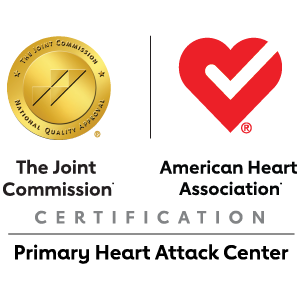If you think you are having a heart attack, call 911.
Heart attacks (or myocardial infarctions) occur when blood flow to the heart is partially or completely blocked. If left untreated, the heart muscle becomes weak and cannot pump blood to the rest of the body. Not all heart attacks are fatal.
Signs and Symptoms of a Heart Attack
- Chest pain, discomfort, heaviness or ache
- Lightheadedness, nausea or vomiting
- Jaw, neck or back pain
- Arm/shoulder pain or discomfort
- Shortness of breath
- Heartburn
24/7 STEMI Care
A severe type of heart attack called a STEMI (ST elevation myocardial infarction) happens when the coronary artery, which supplies blood to the heart, has a sudden, total blockage. Treating a STEMI is time-sensitive. The faster the treatment, the better the chances for a favorable outcome.
Phelps Health is equipped to treat STEMI patients 24 hours a day, 7 days a week, 365 days a year. We have two cardiac catheterization labs and a team of interventional cardiologists extensively trained in catheterization procedures. Patients experiencing a STEMI can be treated – and recover – in their own community, with their support system close by.
Phelps Health has been designated as a Level II STEMI Center in Missouri. According to the Missouri Department of Health and Senior Services (DHSS), a Level II STEMI Center plays an important role in providing access into the healthcare system and patient care in nonmetropolitan areas.
Learn more about our accreditations.
Prevention of Heart Attacks
Several lifestyle changes can be made to help prevent heart attacks.
- If you smoke, quit.
- Eat healthy. The Mediterranean diet or whole food plant-based diet are both heart healthy diets.
- Watch for high cholesterol.
- Monitor your blood pressure regularly.
- Get active and exercise.
- Watch your weight.
- Find ways to reduce stress.
- If you have diabetes, manage this condition.
- Limit the amount of alcohol you drink.
Treatments for Heart Attacks
Phelps Health has two cardiac catheterization labs and a team of interventional cardiologists trained in catheterization procedures to open blocked arteries and restore blood flow, which can help prevent heart damage. Patients who have a heart attack may be treated in one or more of the following ways:
- Angioplasty - A tube with a balloon is inserted into the artery, and the balloon is inflated to open the blocked artery.
- Coronary artery bypass surgery – Another blood vessel is used to bypass the blocked artery, so blood can flow again.
- Stents – Small, wire mesh tubes are inserted into the artery to keep the artery open and restore blood flow.
- Medications – Various medicines may be prescribed to prevent or break up blood clots.
